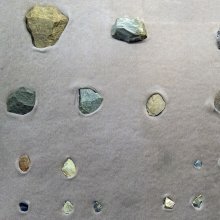Dang, Ḍāṅg: 2 definitions
Introduction:
Dang means something in the history of ancient India, Hindi. If you want to know the exact meaning, history, etymology or English translation of this term then check out the descriptions on this page. Add your comment or reference to a book if you want to contribute to this summary article.
Images (photo gallery)
India history and geography
Source: Cologne Digital Sanskrit Dictionaries: Indian Epigraphical GlossaryḌāṅg.—(IA 26), also spelt dāṅk, corrupt form of ṭaṅka. Note: ḍāṅg is defined in the “Indian epigraphical glossary” as it can be found on ancient inscriptions commonly written in Sanskrit, Prakrit or Dravidian languages.
--- OR ---
Ḍāṅg.—corrupt form of ṭanka (q. v.); cf. dāṅk. Note: ḍāṅg is defined in the “Indian epigraphical glossary” as it can be found on ancient inscriptions commonly written in Sanskrit, Prakrit or Dravidian languages.
Source: Shodhganga: Vernacular architecture of Assam with special reference to Brahmaputra ValleyDang is a Tai Khamyang term referring to “handle attached to ladder dangor ghar - room with the main post”.—It appears in the study dealing with the vernacular architecture (local building construction) of Assam whose rich tradition is backed by the numerous communities and traditional cultures.

The history of India traces the identification of countries, villages, towns and other regions of India, as well as mythology, zoology, royal dynasties, rulers, tribes, local festivities and traditions and regional languages. Ancient India enjoyed religious freedom and encourages the path of Dharma, a concept common to Buddhism, Hinduism, and Jainism.
Languages of India and abroad
Hindi dictionary
Source: DDSA: A practical Hindi-English dictionaryDang in Hindi refers in English to:—(a) wonder-struck, astonished, flabbergasted; —[raha jana] to be wonder-struck/astonished/flabbergasted..—dang (दंग) is alternatively transliterated as Daṃga.
...
See also (Relevant definitions)
Starts with (+139): Damgagu, Damgahaku, Damgahode, Damgakuru, Damgamasti, Damgani, Damgapalaka, Damgayita, Damgayta, Damge, Damgegara, Damgegol, Damgekora, Damgeyamgol, Damgeyelu, Damgore, Damgu, Damgubadi, Damgubadu, Damgudi.
Ends with (+62): Akar mempelas padang, Bai badang, Bai hua lie dang, Bai-bidang, Baibidang, Baobadang, Baul dang, Bauldang, Cah dang, Cha padang, Chhedang, Chuan dang, Co dang, Da giao dang, Dalandang, Dhatki madang, Dieng-sohkhyrdang, Dot dang, Embalau padang, Fen zhi lie dang.
Full-text (+59): Cah dang, Plaa trob dang, Dang hoang, Baul dang, Muop dang, Lupin-dang, Vang dang, Lie dang, Dang het, Pho dang, Dang dinh, Chuan dang, Dang'ite, Dang het khmoch, Da giao dang, Bai hua lie dang, Dang ping, Dang wa ma, Wan guan lie dang, Shan lang dang.
Relevant text
Search found 15 books and stories containing Dang, Ḍāṅg; (plurals include: Dangs, Ḍāṅgs). You can also click to the full overview containing English textual excerpts. Below are direct links for the most relevant articles:
Guhyagarbha Tantra (with Commentary) (by Gyurme Dorje)
Text 15.23 (Commentary) < [Chapter 15 (Text and Commentary)]
Text 15.6 (Commentary) < [Chapter 15 (Text and Commentary)]
Text 1.15 (Commentary) < [Chapter 1 (text and commentary)]
Bodhisattvacharyavatara (by Andreas Kretschmar)
Khenpo Kunpal's Commentary (tibetan)
Śāntideva’s Bodhisattva-caryāvatāra - Tibetan Text
Text Section 151-153 < [Khenpo Chöga’s Oral Explanations]
Mūlamadhyamakakārikā (by Nāgārjuna)
Chapter 8 - Investigation of Act and Actor
Chapter 3 - Investigation of the Sense Organs
Reverberations of Dharmakirti’s Philosophy (by Birgit Kellner)
Tibet (Myth, Religion and History) (by Tsewang Gyalpo Arya)
7. The Myth of Cosmic Egg < [Chapter 1 - Early Tibetan Origin Myth]
5. Scholarly Debate and the Revelation < [Chapter 1 - Early Tibetan Origin Myth]
2. Geographical Extent of Zhangzhung < [Chapter 2 - Zhangzhung Civilization]
Blue Annals (deb-ther sngon-po) (by George N. Roerich)
